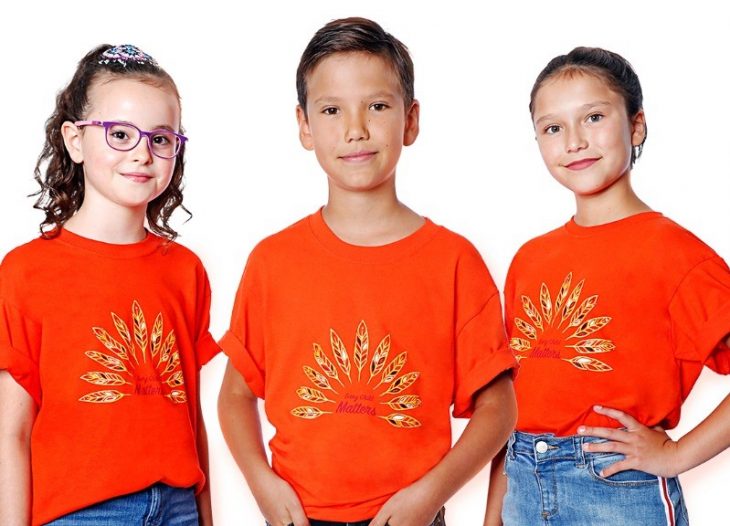
T-shirt from Ojibwe artist available through Rogers aims to build awareness of residential schools’ impact
TORONTO – Starting today, and ahead of World Indigenous Peoples’ Day on Sunday, a special orange t-shirt designed by Ojibwe artist Patrick Hunter will be showcased across Rogers Communications-owned media assets, including Today’s Shopping Choice and available at tsc.ca/wewearorange.
Proceeds from sales will go to the Orange Shirt Society’s ongoing efforts to expand Indigenous education and to inform Canadians on the history and impact of the country’s former residential school system – and advocate for action on reconciliation.
Commissioned by Rogers, Hunter’s t-shirt was unveiled in June and “as we step towards Orange Shirt Day on September 30, the shirt available to Canadians is a tribute to the lives affected and lost through the residential school system, which saw more than 150,000 Indigenous youth sent away from their parents beginning in the 19th century. The last school closed in 1996,” says the Rogers release.
“In most of the Indigenous communities in Canada, receiving an eagle feather is an honour that comes after going above and beyond in service to your community or recognition of personal growth. I chose 11 feathers to honour the four directions because the residential school system stretched in every direction on Turtle Island, and the seven Grandfather teachings (love, respect, bravery, truth, honesty, humility, and wisdom), all arranged in the shape of a sunrise,” said Hunter, in the release, referencing the design.
“Every day is a gift. Every Child Matters is about honouring the victims of residential schools. Not just the people that survived the horrors and lived to talk about it, but also the thousands that were silenced forever. They are not forgotten and we can remember them each new day as the sun rises.”
Survivors of the residential schools and their families continue their healing today, including author Phyllis Webstad who was sent to a residential school in 1973 when she was six years old.
“I remember going to Robinson’s store and picking out a shiny orange shirt. It had string laced up in front and was so bright and exciting. When I got to the Mission, they stripped me, and took away my clothes, including the orange shirt! I never wore it again,” said Webstad, the executive director of the Orange Shirt Society, in the press release.
“The colour orange has always reminded me of that and how my feelings didn’t matter, how no one cared and how I felt like I was worth nothing. I have been on this healing journey since then. I finally get it, that the feeling of worthlessness and insignificance, ingrained in me from my first day at the mission, affected the way I lived my life for many years. Even now, when I know nothing could be further than the truth, I still sometimes feel that I don’t matter.”
“Orange Shirt Day is an opportunity for our team and all Canadians to come together to recognize this important part of our current history, and to share hope for the future,” said Kim Barrington, chair, Indigenous Peoples’ Network, Rogers Communications. “The more we can continue to tell stories and connect people to the history and culture of Indigenous Peoples, the further we will go on our path forward.”


